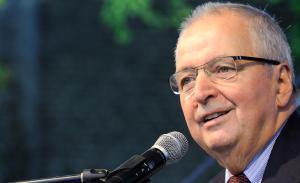Single title
He has served both as German Environment Minister and Executive Director of the United Nations Environment Programme (UNEP), and he is now the Founding Director of the Institute for Advanced Sustainability Studies (IASS) in Potsdam. Today Prof. Klaus Töpfer turns 75, and in an interview with KAS.de, he takes a look back at his life in politics, discusses worldwide climate targets, and expresses his views on Germany’s switch to renewable energy sources.
Töpfer says that everyone today should be able to see that no concern could be more conservative than protecting creation. “We don’t need to ask what we are getting out of a certain animal or plant species or another – we need to view respect for creation as a basic tenet of conservatism and Christianity,” says the former Environment Minister. “We need to pass on the message to young people that it’s not all about generating material wealth but also about keeping the world habitable for nine billion people.”
Sustainable energy for everyone by 2030
Of course, Töpfer says, there are always going to be difficulties in shifting from one large-scale technology to another, as is currently the case with the German switch to renewables – and this is why the sensible further development of the Renewable Energy Act is crucial. Töpfer also believes it is important to introduce more elements of competition and to ask which deserving technologies we should continue to subsidise, directly or indirectly. “There is a lot that still needs to be implemented, but one thing is clear: the technology for harvesting solar and wind energy is all there,” he says, going on to explain that so much electricity is now generated by photovoltaic cells on particularly sunny days that Germany has to export large quantities of it at low prices. Plus, he continues, new technologies for energy storage and transport are being developed. He points towards the 700 energy cooperatives that have been formed to date as evidence of the appeal of decentralised energy generation and storage. “The whole world is watching what Germany does with great interest,” he declares.
If UN Secretary-General Ban Ki-moon wants to set a target to ensure a sustainable energy supply for everyone by 2030, then Germany has to succeed, says Töpfer. “We will not reach this target by using fossil fuels such as coal, oil and gas, or with nuclear power. We can only achieve this by developing decentralised energy technologies that can be obtained economically all over the world,” he says. A technological leader, Germany has managed to overcome the crisis and maintain stability thanks to clever politics and economic strategies, and Töpfer believes that “technological leadership and economic stability are the conditions needed to foster the breakthrough of new technologies.” Associates in Asia and Africa often confirm his view that Germany must stay on track so that it can eventually help other countries get into a position where they can use sustainable and environmentally friendly energy technologies for the coming century. “If we succeed in that, then we have really made a contribution towards keeping the peace on a planet of nine billion people,” Töpfer states, since poverty first and foremost means energy poverty.
“Germany has a great responsibility”
“If we want to overcome poverty in this world, then we have to find solutions in the form of energy sources that allow other nations to make economic progress without destroying the stability of ecosystems and the world as a whole” – Töpfer believes that Germany can and must lead in this. “Back when we began to desulphurise coal power plants, everyone was saying the Germans were crazy. Today, desulphurisation technology is used globally as a matter of course. Without it, the negative impact of sulphur emissions would have already spiralled out of control in China,” says Töpfer. It is therefore Germany’s responsibility to demonstrate that a certain lifestyle and level of technological progress can be achieved that also allows other countries to acquire wealth and that does not come at the cost of creation.




